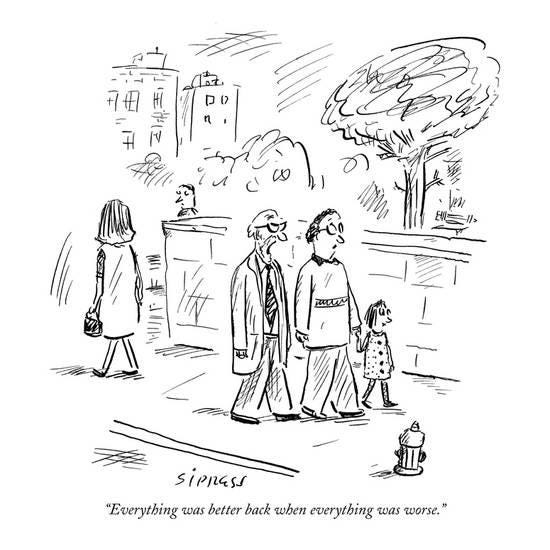One of my favorite scenes in Man of Steel is when young Clark first discovers his powers at elementary school. His senses are hypersensitive and, by activating all at once, trigger a seizure.
Suddenly, he can see not just people’s appearance, but their insides, bones, organs. He can hear not just loud noise, but every noise, even tiny ones far away. Overwhelmed with all the impressions, he runs away and hides.
The whole class gathers outside the closet he’s locked himself in, but, ultimately, his mom must come to his rescue. At first, he won’t let her in.
“The world’s too big, Mom.”
But then, Martha Kent shares a piece of advice that could only ever make sense coming from a loving, compassionate mother:
“Then make it small.”
The Good Thing About Fame
A few days ago, I was looking for gameplay clips from Assassin’s Creed: Odyssey because, you know, procrastination. I found theRadBrad. After watching a few videos, I realized he has 9.8 million subscribers. That’s more than the entire population of Austria, Honduras, or Hungary.
I’m a gamer at heart. I’ve used Youtube for as long as it exists. And yet, I had never heard of theRadBrad, one of the biggest channels in this sector.
I guess it’s true. The world has become a big place. Or, maybe it always was.
Christianity has remained the world’s largest religion for the past 200 years. But it still covers just a third of our planet’s population. That means one of, maybe the most famous person in history — Jesus Christ — is someone most people have never heard of.
I think that’s a good thing. It’s soothing. The problem is I keep forgetting it.
All It Takes Is Pancakes
In an early How I Met Your Mother episode, Barney shares one of his most memorable quotes:
“You know what Marshall needs to do? He needs to stop being sad. When I get sad, I stop being sad and be awesome instead. True story.”
But, unless you can seamlessly switch from one irrational, emotional state to another, like Barney, that’s not so easy, is it? It sure wasn’t for Marshall. For 67 days after his breakup, he was a miserable, weeping puddle of his former self.
Every day, some new trigger would launch him into another nightmare about his ex. Where’s Lily? What is she doing? And with whom? Why that? Why now? Why there? Of course, none of his obsessive behavior gave any answers.
Eventually, after over two months, his roommates woke up to the smell of fresh pancakes. Marshall was over the hump. Why now? What changed?
The world was too big. And, finally, Marshall had made it small.
Pretend It’s an Island
I think most of my sadness is overwhelm in disguise. The world’s too big. I postpone all kinds of decisions until I do something stupid or extreme. As a result, I lose even more time, which only reinforces the cycle.
But it all starts with the fact that there’s too much of everything. Too many projects to tackle. Too many notifications to answer. Too many people to meet. Too many places to go. Too many shows to watch. Too many books to read.
I know I’ll never get to it all. So there’s always someone to disappoint. Even if it’s just myself. But it never fails to sting.
The only way I can ever move past this is by doing what Martha told Clark:
“Just focus on my voice. Pretend it’s an island, out in the ocean. Can you see it?”
“I see it.”
“Then swim towards it, honey.”
When the world’s too big, I have to forget it for a while. I have to start swimming.
The Only Thing We Can Do
On Nov 27th, 2006, Brad Colburn created a Youtube account. It had zero subscribers. Now, every time he launches another playthrough, he says:
“So guys it’s, uh, it’s kind of hard to start off these big games. ‘Cause I know that this series is gonna have a lot of people watching.”
No single human is meant to have an entire country follow them around. We’re tribal creatures. Not global citizens. No matter how much we wish we were. The sheer mental presence of more than a few dozen people is enough to cause serious anxiety. It’s a huge responsibility to shoulder.
So the best thing, the only thing, really, that RadBrad can do is to make another video. Just one. Pretend it’s an island. Start swimming. I don’t know Brad personally. But I can tell you, every time he forgets this, he feels sad and overwhelmed.
And when he remembers? He finds his way back to happy.
We’re All Clark Kent
The internet has made all of us hypersensitive. We’re all Clark Kent. We can see not just people’s appearance, but their insides, thoughts, emotions. We can hear not just loud noise, but every noise, even tiny ones far away.
And sometimes, it makes us want to run away and hide. When Marshall sifted through his ex-lover’s credit card transactions, his world was too big. Too many terrible fantasies. Too many alternatives to imagine. Only when he said “stop,” when he refused to engage with the noise, could he focus on what was right in front of him: two hungry friends.
If Superman existed, how long would it take until the whole world knows him? A month? A year? In any case, he better master his senses. Unlike him, however, we can turn off the noise. Disconnect. Get quiet.
What’s more, we’ll never carry quite as much responsibility. If we’re really lucky, how many people will follow us? A couple thousand? A few million? Still, most of the world will never know who we are. We’ll always stay small.
Remembering this smallness is where happiness lies. Forget the vastness that’s out there. It does nothing for you. Just focus on one voice. One friend. Make one video. And then do it again.
The world’s too big. Even for the best of us. Let’s carve out our own space. Make it small. Find your island. And then swim towards it.


















